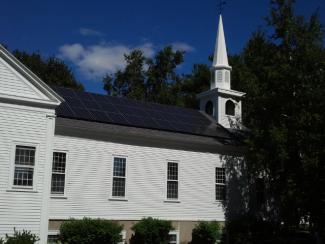St. Dunstan’s Church in Dover has long been one of the Episcopal Diocese of Massachusetts’ standard-bearers for creation care initiatives, and now the parish has signed on to a national commitment to further reduce the size of its carbon footprint.
The St. Dunstan’s vestry voted in late April to sign on to the Paris Pledge, an initiative of the national organization Interfaith Power & Light that asks signers to reduce carbon emissions by 50 percent by 2030 and become carbon neutral by 2050 (learn more here). Interfaith Power & Light is encouraging as many member organizations as possible to join the Paris Pledge. The resolution passed by the St. Dunstan's vestry in fact has an even shorter timeline than the Paris Pledge, expressing the intention to be carbon neutral by 2025, according to Jim Nail, the president of Massachusetts Interfaith Power & Light and a member of St. Dunstan’s.
The Paris Pledge coincides with the Paris Climate Agreement, a legally binding global climate deal adopted by 195 countries in December 2015 at the Paris climate conference (COP21) and opened for signing at the United Nations on April 22. The signer nations agreed to a long-term goal of keeping global temperatures well below 2 degrees Celsius above pre-industrial levels (with an aim of no more than 1.5 degrees above pre-industrial levels).
Nail led the effort to get the parish to sign onto the Paris Pledge, presenting it to the vestry and hosting conversations for parishioners. The parish plans to accomplish its goal by installing new heating and air conditioning equipment, purchasing additional solar electricity and buying carbon offsets.
Nail said that several pieces of equipment at St. Dunstan’s, including air conditioning and heating units, are nearing the end of their expected lifecycle, and that the church will strategically select new units that are as energy efficient as possible. Efficient technology like air source heat pumps and on-demand water heaters will be added in phases as the old equipment is replaced. (St. Dunstan’s has electric heat in the church, but the office is heated with propane. The propane heat will eventually be phased out in favor of highly efficient air source heating pumps.)
“When it comes time to replace [these items], this commitment to being carbon neutral will become part of the decision-making process. It’s not just, how do we find the cheapest option, but, what is the lowest carbon footprint option that we can go for?” Nail said.
Because St. Dunstan’s solar panels only provide about 60 percent of the energy needed to power the church, part of the plan for going fully carbon neutral is purchasing additional solar energy through a community exchange. Nail said that these “community shared solar projects” are proliferating in Massachusetts.
Twelve churches in Massachusetts have signed onto the Paris Pledge, including four congregations in the Diocese of Massachusetts: St. Mary’s Church in Barnstable, St. Barnabas's Church in Falmouth, St. Andrew's Church in Framingham and Grace Church in Medford.
Nail said the most important thing for churches wishing to reduce their carbon footprint is to assemble a team and set clearly defined goals.
The Paris Agreement is an ambitious example of a goal, and Nail also suggests the Massachusetts Global Warming Solutions Act, which calls for a 20 percent reduction in carbon emissions by 2020, as a starting point. The Massachusetts Interfaith Power & Light Web site has a range of resources for churches looking to get started.
The commitment coincides with St. Dunstan’s 50th anniversary celebration.
“We will be looking at what the next 50 years will mean for St. Dunstan’s,” Nail said. “We’ve always had a strong core of environmental awareness, so we’re building on that, continuing it, knowing that the next 50 years are make or break for climate change. We’re going to do everything we can.”
--Ellen Stuart Kittle

